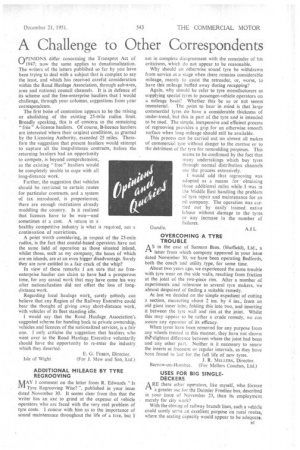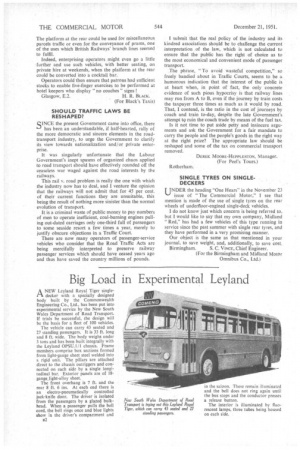A Challenge to Other Correspondents
Page 35

Page 36

If you've noticed an error in this article please click here to report it so we can fix it.
OPINIONS differ concerning the Transport Act of 1947; now the same applies to denationalization. The writers of the letters publiihed so far by you have been trying to deal with a subject that is complex to say the least, and which has received careful consideration within the Road Haulage Association, through sub-area, area and national council channels. It is in defence of its scheme and the free-enterprise hauliers that I would challenge, through your columns, suggestions from your correspondents.
The first bohe of contention appears to be the raising or abolishing of the existing 25-mile radius limit. Broadly speaking, this is of concern to the remaining " free " A-licence hauliers. Of course, B-licence hauliers are interested where their original conditions, as granted by the Licensing Authority, exceeded 25 miles. Therefore the suggestion that present hauliers would attempt to capture all the long;distance contracts, before the returning hauliers had an opportunity to compete, is beyond comprehension, as the existing " free " hauliers would be completely unable to cope with all long-distance work.
Further, the suggestion that vehicles should be restricted to certain routes for particular contracts, and a system of tax. introduced, is preposterous; there are enough restrictions already muddling the country. Is it realized that licences have to be won—and sometimes at a cost. A return to a healthy competitive industry is what is required, not a continuation of restrictions.
A point worth considering, in respect of the 25-mile radius, is the fact that coastal-based operators have not the same field of operation as those situated inland, whilst those, such as my company, the bases of which are on islands, are at an even bigger disadvantage. Surely they are now entitled to a fair crack of the whip?
In view of these remarks I am sure that no free enterprise haulier can claim to have had a prosperous time, for any casual work that may have come his way after nationalization did not offset the lass of longdistance work.
Regarding local haulage work, surely nobody can believe that any Region of the Railway Executive could bear the thought of giving away short-distance work, with vehicles of its fleet standing idle.
I would say that the Road Haulage Association's suggested scheme for handing back to private ownership, vehicles and licences of the nationalized services, is a fair one. I only criticise the suggestion that hauliers who went over to the Road Haulage Executive voluntarily should have the opportunity to re-enter the industry which they deserted.
tre'll E. G. FEBEN, Director.
Isle of Wight. (For J. Mew and Son, Ltd.) ADDITIONAL MILEAGE BY TYRE REGROOVING MAY I comment on the letter from R. Edwards "Is
Tyre Regrooving Wise? ", published in your issue dated November 30. It seems clear from this that the writer has an axe to grind at the expense of vehicle operators who are faced with the very real problem of tyre costs. I concur with him as to the importance of sound maintenance throughout the life of a tyre, but I
am in complete disagreement with the remainder of his criticisms, which do not appear to be reasonable.
Why should an otherwise sound tyre be withdrawn from service at a stage when there remains considerable mileage, merely to assist the retreader, or, worse, to have this mileage buffed away during recapping?
Again, why should he refer to tyre manufacturers as supplying special tyres to passenger-vehicle operators on a mileage basis? Whether this be so or not seems immaterial. The point to bear in mind is that large commercial tyres do have a considerable thickness of under-tread, but this is part of the tyre and is intended to be used. The simple, inexpensive and efficient process of regrooving provides a grip for an otherwise smooth surface when long mileage should still be available.
This process can be carried out on almost all makes of commercial tyre without danger to the carcase or to the detriment of the tyre for remoulding purposes. This seems to be confirmed by the fact that many undertakings which buy tyres through normal distribution channels use the process extensively.
I would add that regrooving was adopted as a means for obtaining those additional miles while I was in the Middle East handling the problem of tyre repair and maintenance for an oil company. The operation was carried out by easily trained native labour without damage to the tyres or any increase in the number of failures.
OVERCOMING A TYRE TROUBLE
AS in the case of Sansani Bros. (Sheffield), Ltd., a letter from which company appeared in your issue dated November 30, we have been operating Bedfords, both the coach and utility type, for some time. About two years ago, we experienced the same trouble with tyre wear on the side walls, resulting from friction at the joint of the two-piece rim. After a number of experiments and reference to several tyre makers, we almost despaired of finding a suitable remedy.
At last we decided on the simple expedient of cutting a section, measuring about 2 ins. by 4 ins., from an old giant inner tube, folding this into two, and inserting it between the tyre wall and rim at the joint. Whilst this may appear to be rather a crude remedy, we can assure any operator of its efficacy.
When tyres have been removed for any purpose from any wheels treated in this manner, they have not shown the'slightest difference between where the joint had been and any other part. Neither is it necessary to renew the inserts at frequent or regular intervals, as they have been found to last for the full life of new tyres.
J.R. MELLERS, Director. Barrow-on-Hurnber. (For Mel lers Coaches, Ltd.) USES FOR BIG SINGLE DECKERS
RE there other operators, like myself, who foresee 1-1A a greater use for the Daimler Freeline bus, described in your issue of November 23, than its employment merely for city work?
With the closing of railway branch lines, such a vehicle could surely serve an excellent purpose on rural routes, where the seating capacity would appear to be adequatt. The platform at the rear could be used for miscellaneous parcels traffic or even for the conveyance of prams, one of the uses which British Railways' branch lines seemed to fulfil.
• Indeed, enterprising operators might even go a little -further and use such vehicles, with better seating, on private hire at weekends, when the platform at the rear could be converted into a cocktail bar.
Operators could then ensure that patrons had sufficient stocks to enable five-finger exercises to be performed at hotel keepers who display " no coaches" signs !
Glasgow, E.2. H. R. BLACK.
(For Black's Taxis) SHOULD TRAFFIC LAWS BE RESHAPED?
SINCE the present Government came into office, there has been an understandable, if half-hearted, rally of the more democratic and sincere elements in the roadtransport industry, to urge the Government to clarify its view towards nationalization and/or private enterprise.
It was singularly unfortunate that the Labour Government's inept spasms of organized chaos applied to road transport should have effectively rounded off the ceaseless war waged against the road interests by the railways.
This rail v. road problem is really the one with which the industry now has to deal, and I venture the opinion that the railways will not admit that for 45 per cent. of their current functions they are unsuitable, this being the result of nothing more sinister than the normal evolution of transport.
It is a criminal waste of public money to pay numbers of men to operate inefficient, coal-burning engines pulling out-dated carriages only one-third full of passengers to some seaside resort a few times a year, merely to justify obscure objections in a Traffic Court.
There are now many operators of passenger-service vehicles who consider that the Road Traffic Acts are being mercifully interpreted to preserve railway passenger services which should have ceased years ago and thus have saved the country millions of pounds.
I submit that the real policy of the industry and its kindred associations should be to challenge the current interpretation of the law, which is not calculated to ensure that the public has the right of choice as to the most economical and convenient mode of passenger transport.
The phrase, "To avoid wasteful competition," so freely bandied about in Traffic Courts, seems to be a humorous indication that the interest of the public is at heart when, in point of fact, the only concrete evidence of such pious hypocrisy is that railway lines may run from A to B, even if the journey by train costs the taxpayer three times as much as it would by road. That, I contend, is the ratio in the cost of journeys by coach and train to-day, despite the late Government's attempt tc? ruin the coach trade by means of the fuel tax.
Is it not time to put aside petty and insincere arguments and ask the Government for a fair mandate to carry the people and the people's goods in the right way at the right price? The appropriate law should be reshaped and some of the tax on commercial transport removed.
DEREK MOORE-HEPPLESTON, Manager. (For Peel's Tours.) Rotherham.
SINGLE TYRES ON SINGLEDECKERS
UNDER the heading "One Hears" in the November 23 issue of "The Commercial Motor," I see that mention is made of the use of single tyres on the rear wheels of underfioor-engined single-deck vehicles.
I do not know just which concern is being referred to. but I would like to say that my own company, Midland "Red," has had a few vehicles of this type running in service since the past summer with single rear tyres, and they have performed in a very promising manner.
Our object is the same as that mentioned in your journal, to save weight, and, additionally, to save cost.
Birmingham. S. C. VINCE, Chief Engineer.
(For the Birmingham and Midland Motor Omnibus Co., Ltd.)












































































